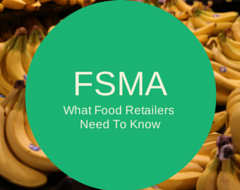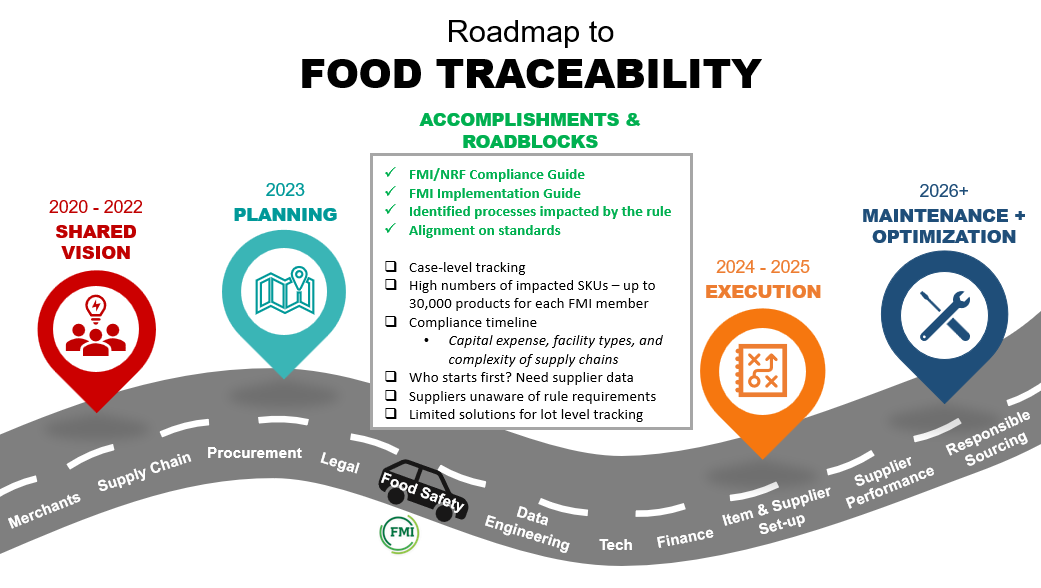This post is part of a series on What Food Retailers Need to Know about the Food Safety Modernization Act.
By: Stephanie Barnes, Regulatory Counsel, Food Marketing Institute 
The Food Safety Modernization Act (FSMA), for the first time, includes changes related to foreign supplier verification that will affect importers of foreign food. The Foreign Supplier Verification Program (FSVP) will fundamentally change the way food is imported and produced internationally. FSMA provides significant enhancements to FDA’s ability to achieve greater oversight of the millions of food products coming into the U.S. from other countries each year. An estimated 15 percent of the U.S. food supply is imported, including 60 percent of fresh fruits and vegetables and 80 percent of seafood.
FSVP places new obligations on U.S. food importers to ensure that the food they are importing is produced in compliance with FDA food regulations. More specifically, relative to import food safety, FSMA requires importers to perform supplier verification activities to ensure imported food is safe and authorizes FDA to refuse admission to imported food if the foreign facility or country refuses to allow an FDA inspection.
The FSVP rule applies to an importer, which is defined as “the person in the U.S. who has purchased an article of food that is being offered for import into the U.S. If the article of food has not been sold, then the importer is the U.S. consignee. If there is no U.S. buyer or U.S. consignee at the time the article is entered into the U.S., then the importer is the U.S. agent or representative of the foreign owner or consignee at the time of entry.” The basic idea is that the importer must develop a verification program to ensure that their foreign supplier is in compliance with FDA’s regulations, including the produce safety rule and the preventive controls rule.
Notably, all food retailers and wholesalers who are importing food will be required to develop, maintain and follow an FSVP for each food imported into the U.S. Retailers and wholesalers who are considered importers under FSVP should maintain detailed records on the compliance status of their foreign suppliers, conduct a robust hazard analysis for each food, and only import from approved foreign suppliers. Once the importer has conducted the hazard analysis they will then have the flexibility to choose the appropriate verification activities based on the risk evaluation.
Retailers and wholesalers should maintain vigorous documentation that they adequately control any hazards controlled by them for the foods they import, as well as documentation that their customers adequately control hazards. Depending on the hazard, retailers and wholesalers will be required to annually conduct onsite audits or obtain audit reports of their foreign suppliers or perform other appropriate verification procedures. In the event that a supplier is determined to be non-compliant, retailers and wholesalers should comprehensively document investigations into the adequacy of the FSVP, related corrective actions and any changes made to the FSVP. Importers are also required to establish and implement procedures for periodically reassessing their FSVP, which include comprehensive documentation of the reassessment and any resultant changes.
Clearly, FSVP will have a significant impact on any retailer or wholesaler that imports products directly and could have farther-reaching implications across the food industry since foreign exporters will now be required to meet FDA’s standards set in the preventive controls and produce safety rules.
A final rule is expected in October 2015 with compliance required as early as 2016. Importers should start evaluating their supply chain and foreign suppliers to ensure they will be prepared to develop and implement a foreign supplier verification program by October 2016.
For additional information and resources, please visit FMI’s FSMA Resource webpage. If you have additional questions, please visit FMI’s FSMA questions portal.


 Industry Topics address your specific area of expertise with resources, reports, events and more.
Industry Topics address your specific area of expertise with resources, reports, events and more.
 Our Research covers consumer behavior and retail operation benchmarks so you can make informed business decisions.
Our Research covers consumer behavior and retail operation benchmarks so you can make informed business decisions.
 Events and Education including online and in-person help you advance your food retail career.
Events and Education including online and in-person help you advance your food retail career.
 Food Safety training, resources and guidance that help you create a company food safety culture.
Food Safety training, resources and guidance that help you create a company food safety culture.
 Government Affairs work — federal and state — on the latest food industry policy, regulatory and legislative issues.
Government Affairs work — federal and state — on the latest food industry policy, regulatory and legislative issues.
 Get Involved. From industry awards to newsletters and committees, these resources help you take advantage of your membership.
Get Involved. From industry awards to newsletters and committees, these resources help you take advantage of your membership.
 Best practices, guidance documents, infographics, signage and more for the food industry on the COVID-19 pandemic.
Best practices, guidance documents, infographics, signage and more for the food industry on the COVID-19 pandemic.
